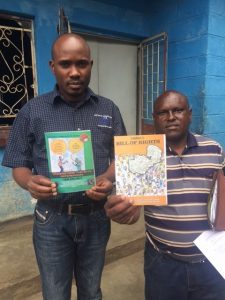Newstalk Explores Fight To Get Bill Of Rights Enacted Into Zambian Constitution
When we assemble freely in public, have the right to clean water, employment, medical care and social welfare we may end up taking it for granted. In Zambia, despite a democratic process to elect the government, many of these rights are not guaranteed in the country’s constitution. An organisation called the Jesuit Centre for Theological Reflection (JCTR) funded by Misean Cara, sets out to change this with years of sustained campaigning often under duress.
“One of the big issues for an organisation like the JCTR, which uses Catholic social teachings principles in its work, is that the bedrock of our work is the question of human rights amongst the other issues of governance,” said Head of the JCTR Jesuit Fr. Leonard Chiti, “so we pay particular attention to what is contained in the constitution that affects the lives of people.”
“When we look at our constitution, we should have all of the rights contained in the bill of rights that are due to a human being but we discovered that they were not contained in our bill of rights. When it comes to economic and social rights – the right to jobs for example or the right to a just wage when you are employed or the right to education, these rights were not in the bill of rights of our constitution.”
Following many years of pressure, the JCTR joined with a wide range of civil society groups, known as the Grand Coalition, to make one major push towards getting a Bill of Rights enacted into the constitution. Building upon a tidal wave of pressure, and amid a climate of unease, distrust and fear they pushed for a date to hold a referendum.
The JTCR campaigned for the institutionalisation of economic, social and cultural rights, through an expanded Bill of Rights of the National Constitution. Economic, social and cultural rights were not guaranteed within the Constitution, and the JTCR believed that these rights would reinforce poverty reduction efforts. The JTCR campaign was strongly focused on the Zambian people with hundreds of consultation sessions for communities across the country.
The JCTR was founded in 1988, and has been promoting integral human development in line with gospel teachings, and the guidance from the Society of Jesus through its General Congregations going back as far as 1975. The promotion of human rights is an integral part of the Jesuit mission.
In this documentary, Brian Kenny talks with some of the key groups that campaigned for the hearts and minds of the Zambian people. He also highlights the fake news that some politicians disseminated to the public to curb the success of the campaign, and how the Grand Coalition fought until the end to get the referendum passed.
Power to the People airs at 8.00am on Sunday 1st October 2017, and will be re-broadcast at 10.00pm on Saturday 7th October 2017 on Newstalk 106-108FM.
ABOUT MISEAN CARA:
Established in 2004, Misean Cara is a movement of 91 vibrant missionary organisations working in more than 60 countries. We work with some of the most marginalised and vulnerable people in developing countries. Adopting a human rights focus, we support communities addressing basic needs in the areas of education, health, and livelihoods, as well as advocating for economic, social, cultural, civil and political rights. At times of humanitarian crisis, the trusted and long‐term presence of missionaries in affected communities also allows for rapid, efficient and targeted responses.
Misean Cara and our members work collectively and individually through the missionary approach to development. This framework is based on five values: respect, justice, commitment, compassion and integrity.
Our Strategy 2017‐2021 identifies five goals:
1. Uphold the right to quality education
2. Uphold the right to better health, clean water and sanitation
3. Uphold the right to sustainable livelihoods
4. Uphold and advocate for human rights
5. Enhance and promote the missionary approach to development.
Further expressing our desire to reach the most vulnerable and marginalised, the Strategy will see Misean Cara bringing a particular focus to bear on targeting five groups: women, children, refugees, displaced people and people with disabilities.
